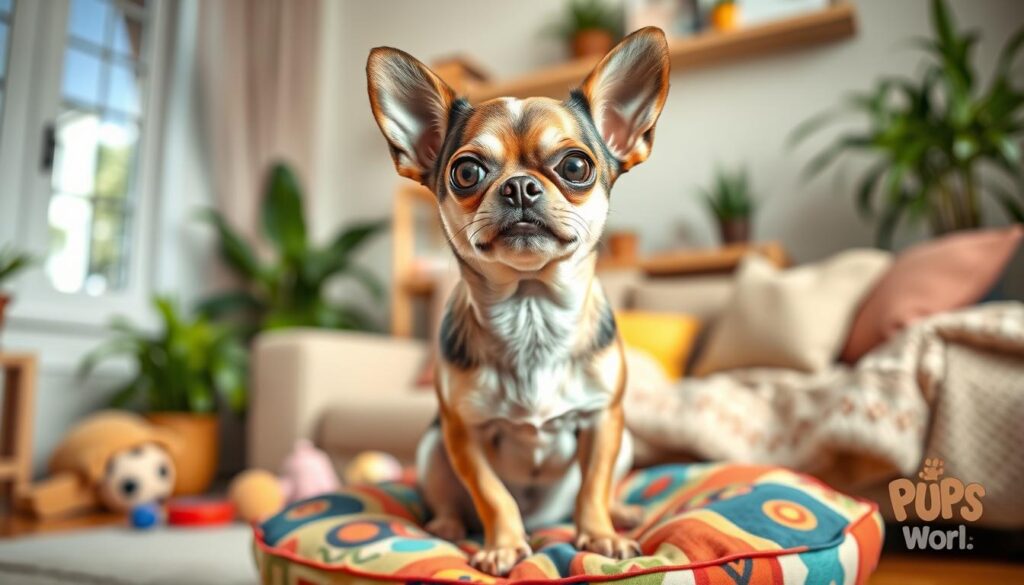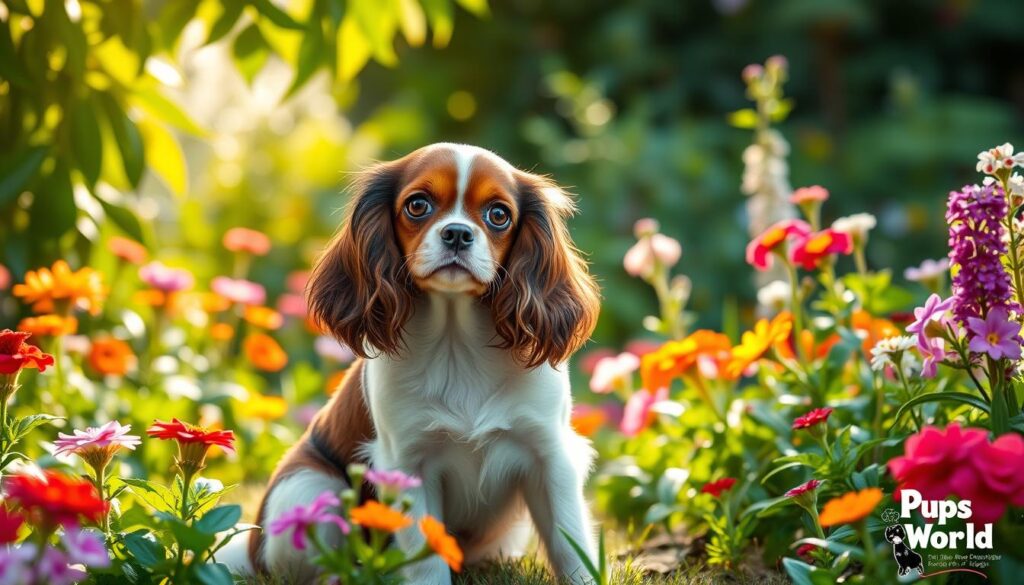Discover the 13 most anxiety ridden dog breeds and learn how to support these sensitive pups. Our guide helps you understand and care for high-strung canines. Did you know that over 70% of dogs show signs of anxiety or fear? This fact shows how common anxiety is in our furry friends. We’re going to look at the 13 dog breeds most likely to feel anxious and stressed. We’ll also share ways to help these sensitive dogs feel better.
We’ll cover why some dogs are more anxious than others. We’ll talk about genetics and what happens around them that makes them stressed. By the end, you’ll know how to make your dog feel safe and calm.
Key Takeaways
- Certain dog breeds are naturally more anxious and stressed.
- Things like bad social skills and not enough play can make these dogs more anxious.
- It’s important to know what these anxious dogs need and what makes them stressed.
- Using training, getting them used to things, and making their world more interesting can help calm them down.
- Knowing the signs of anxiety and acting early can make these dogs happier and healthier.
Table of Contents
Understanding Anxiety in Dogs
We know how important it is to spot and help our dogs with anxiety. Dogs can feel a lot of worry, fear, and stress. These feelings can come from many things, like loud noises or bad past experiences.
What Is Canine Anxiety?
Many dogs deal with anxiety. It shows up in different ways, like being restless, barking a lot, or even shaking. It’s important to know what causes their anxiety to help them feel better.
Common Causes of Anxiety in Dogs
- Genetics: Some dogs are more likely to feel anxious because of their genes.
- Past Traumatic Experiences: Dogs can get anxious from bad past events, like being hurt or scared.
- Environmental Stressors: Things like loud sounds, new places, and changes in their routine can make dogs anxious.
Knowing what causes anxiety in dogs helps us help them. We can make a safe place for our anxious dogs. This way, they can feel more secure and happy.
13 Most Anxiety Ridden Dog Breeds
As dog owners, we know our furry friends can be nervous and easily scared. Some breeds are more likely to feel anxious than others. We’ll look at the 13 dog breeds that are most anxious, showing their unique traits and what makes them anxious.
The 13 most anxiety ridden dog breeds are super sensitive and stress easily. They range from high-strung and skittish pets to those who get anxious when left alone. These dogs need extra care to keep their anxiety in check.
- German Shepherd
- Chihuahua
- Cavalier King Charles Spaniel
- Bichon Frise
- Toy Poodle
- Shih Tzu
- Labrador Retriever
- Border Collie
- Australian Shepherd
- Pug
- Boston Terrier
- Maltese
- Yorkshire Terrier
These breeds show anxiety in many ways, like barking a lot, shaking, being destructive, or even getting aggressive. It’s important to know what makes these high-strung dogs anxious. This helps us give them the right support and care.

“Anxiety in dogs is a complex issue that requires patience, understanding, and a tailored approach to address the individual needs of each breed.”
We’ll now explore the specific traits and ways to help some of the most anxiety-prone dog breeds.
German Shepherd
German Shepherds are known for their loyalty, smarts, and protective nature. But, they can get anxious because they’re sensitive and bond strongly with their owners. We’ll look into why German Shepherds get anxious and how to spot stress in them.
Reasons for Anxiety
German Shepherds pay close attention to their world and can feel overwhelmed by new things. Here are some reasons why they might get anxious:
- Separation anxiety: These dogs are very attached to their owners and can get upset when left alone for a long time.
- Fear-based anxiety: They might be scared of loud noises like thunderstorms or fireworks, which can make them anxious.
- Lack of socialization: Not getting to meet new people, animals, and places when they’re young can make them anxious.
Recognizing Signs of Stress
German Shepherds that are easily stressed show different behaviors and physical signs. Look out for these signs of stress:
- Excessive panting or drooling
- Trembling or shaking
- Avoidance behaviors, such as hiding or retreating
- Destructive behaviors, like chewing or digging
- Restlessness or pacing
If you see these signs in your German Shepherd, it’s key to find out why they’re anxious. Then, work with a pro to help them feel better.
“German Shepherds are incredibly loyal and protective, but their sensitivity can also make them prone to anxiety. Understanding the triggers and recognizing the signs of stress is crucial for helping these high-strung dogs feel safe and secure.”
Chihuahua
Chihuahuas are often seen as bold dogs, but they can be anxious and fearful too. These small dogs are very sensitive to their surroundings. This makes them easily scared and skittish. They are one of the most anxious dog breeds, so it’s important to understand their needs.
Chihuahuas have big personalities in their small bodies. But, this can make them more anxious and fearful. They feel vulnerable because of their size, which makes them very alert and reactive. Their strong will also adds to their anxiety, as they find it hard to handle changes or new things.
It’s important for pet owners to know how to spot anxiety in Chihuahuas. These shy dogs might bark a lot, shake, hide, or even be aggressive when they feel scared. Knowing what triggers their anxiety helps owners help their pets feel safer and calmer.
Managing Anxiety in Chihuahuas
To help Chihuahuas with anxiety, you need to do several things. Start by socializing them early to make them more confident. Also, create a calm and predictable home and use positive training methods. These steps can really help Chihuahuas deal with their anxiety.
With patience and the right support, Chihuahuas can get better and feel less anxious. By meeting their special needs and making a safe home, owners can help these small dogs feel more confident and less scared every day.

Cavalier King Charles Spaniel
The Cavalier King Charles Spaniel is a breed known for its loving and affectionate nature. These dogs are also prone to anxiety, especially when separated from their owners. Let’s look into their anxiety and find ways to help them.
Anxiety-Prone Temperament
Cavalier King Charles Spaniels are often seen as worry-prone hounds. They bond deeply with their human families, which can cause them distress when left alone. These gentle dogs need companionship and can get anxious with even short separations. They might bark a lot, chew things they shouldn’t, or even have accidents in the house.
Managing Separation Anxiety
To help with the Cavalier’s separation anxiety, we need a detailed plan. Start by slowly getting them used to being alone, with short periods that get longer over time. Giving them fun toys and puzzle feeders can keep them busy and less anxious when you’re away.
Creating a calm space with soft music or pheromone diffusers can also soothe them. Getting advice from a certified animal behaviorist or trainer can help make a plan that works for your Cavalier.

With patience and the right strategies, you can help your Cavalier King Charles Spaniel deal with their separation anxiety. This way, they can live a happy, worry-free life with you.
Bichon Frise
The Bichon Frise has a fluffy white coat and a playful nature, making it seem like a great pet. But, these pets can get stressed and anxious during grooming and handling. It’s important to know why they feel this way to help them.
Grooming Woes: Why Bichons Become Stressed
These dogs need regular grooming to keep their soft, hypoallergenic coat looking good. But, this can stress them out. Being close to the groomer, hearing new sounds, and feeling uncomfortable from brushing or trimming can make them anxious.
Bichons are sensitive and can get overwhelmed by new things. The grooming setting, with its strange smells, sounds, and people, can make them stressed. This makes grooming hard for them.
Easing the Grooming Experience
- Gradually Desensitization: Introduce your Bichon Frise to grooming tools and techniques gradually, allowing them to become comfortable with the process over time.
- Positive Reinforcement: Reward your Bichon with treats and praise during and after grooming sessions to create a positive association with the experience.
- Calming Supplements: Consult your veterinarian about the use of natural calming supplements or medications to help your Bichon Frise stay relaxed during grooming.
- Familiar Environment: Consider having grooming sessions in a familiar, comfortable setting, such as your own home, to reduce stress and anxiety.
Understanding the grooming challenges Bichon Frises face and how to help them can make grooming easier. With patience, positive reinforcement, and a caring approach, your Bichon Frise can have a stress-free grooming experience.
Toy Poodle
Toy Poodles are loved for their smarts and loving nature. But, they can be very sensitive to their surroundings. These timid dogs often get anxious easily, which affects their happiness and actions.
Environmental Sensitivity
Toy Poodles pay close attention to their world. Small changes or loud noises can make them anxious. It’s important to make a calm space for them to live in.
To make your Toy Poodle feel calmer, try these tips:
- Keep a regular daily routine to give them stability.
- Keep loud noises and sudden changes to a minimum at home.
- Give them a cozy spot to hide and feel safe.
- Use calming pheromones or natural supplements to soothe them.
- Make sure they get enough exercise and mental activities to reduce stress.
“Understanding and addressing the environmental sensitivity of Toy Poodles is key to helping these nervous canines feel safe and secure in their own homes.”
Shih Tzu
The Shih Tzu is a beloved breed that often faces social challenges. These challenges can lead to anxiety and fearfulness. They struggle to feel at ease in new places and with new people.
Socialization Hurdles for Shih Tzus
Shih Tzus are sensitive and can be aloof. They may be cautious around strangers and new situations. Their small size can make them feel vulnerable, causing more anxiety around big dogs or loud noises.
- Limited early exposure: Shih Tzus are often kept indoors as puppies. This means they miss out on early social experiences that could help them be more confident.
- Grooming-related stress: Regular grooming can cause anxiety for Shih Tzus. They may see it as uncomfortable or unfamiliar.
- Overprotective owners: Some owners, trying to protect their Shih Tzus, might shield them too much. This can make their fears worse.
To help Shih Tzus, it’s key to introduce them to different people, animals, and places slowly and positively. This can help them become more confident and less fearful.
By focusing on the social needs of Shih Tzus, we can help these fearful pups become more adaptable and confident companions. With patience, positive reinforcement, and consistent socialization, Shih Tzus can enjoy the world with less anxiety and more happiness.
Managing Anxiety in Anxious Breeds
Caring for a high-strung or stress-prone dog is a big challenge. But, with the right strategies, we can make our furry friends feel safe and confident. We’ll look at training, desensitization, and environmental enrichment to help anxious dogs.
Training and Desensitization
Positive-reinforcement training is key for anxious dogs. It helps them learn coping skills and builds their confidence. By rewarding them for calm behavior, we teach them to be resilient.
Desensitization is also powerful. It involves slowly getting our dogs used to things that scare them. This can greatly reduce their fear and anxiety.
Environmental Enrichment
Our dogs need a safe, interesting, and predictable space. We can do this with interactive toys, puzzle feeders, and regular walks. These activities keep their minds and bodies busy.
Keeping our homes calm and having a routine also helps. It makes our anxious dogs feel secure. This approach supports their emotional well-being.
Frequently Asked Questions
What is canine anxiety?
Canine anxiety is when dogs feel too much worry, fear, and stress. It can come from their genes, past scary events, or stressful places.
What are the common causes of anxiety in dogs?
Dogs get anxious for many reasons like their genes, past scary events, and stressful places. Knowing why dogs get anxious helps us help them better.
Which dog breeds are the most anxiety-ridden?
Some dog breeds are naturally more anxious. We’ll look at 13 breeds that often feel anxious. We’ll share what makes them anxious and how they act.
Why are German Shepherds prone to anxiety?
German Shepherds are loyal and smart, but they can get anxious. They feel things deeply and bond strongly with owners. We’ll talk about why they get anxious and how to spot stress in them.
What makes Chihuahuas prone to anxiety and fear?
Chihuahuas seem bold but can be anxious and fearful. We’ll talk about their anxiety and how to help them feel better.
How can I manage separation anxiety in Cavalier King Charles Spaniels?
Cavalier King Charles Spaniels love people but can get anxious when left alone. We’ll share ways to help them feel less anxious when separated from their owners.
Why do Bichon Frises experience grooming-related anxiety?
Bichon Frises are happy dogs but can be anxious about grooming. We’ll explain why they get anxious and how to make grooming easier for them.
How can I help my Toy Poodle cope with environmental sensitivity?
Toy Poodles are smart and loving but sensitive to their surroundings. We’ll give tips on making their space calm and less stressful.
What are the socialization challenges faced by Shih Tzus?
Shih Tzus can be anxious, especially when meeting new people or places. We’ll share ways to help them feel more at ease in new situations.
How can I help manage anxiety in my anxious dog breed?
Helping an anxious dog needs a lot of effort. We’ll give tips on training, making them feel safe, and making their world less stressful. With the right help, your anxious dog can be happier and more secure.







1 thought on “13 Most Anxiety Ridden Dog Breeds: A Guide”